
Buying your first property is an exciting milestone, but it's also filled with hidden challenges—especially if you're unaware of the legal and financial complexities involved. Many first-time buyers fall into costly traps due to a lack of guidance and legal support. At KHA Advocates, we specialize in protecting first-time and NRI buyers through our end-to-end legal solutions.

Ensure your investment is secure by identifying and eliminating potential legal pitfalls before finalising the purchase.

Verify property ownership and ensure all documents are legally valid, authentic, and compliant with local regulations.

Structure agreements that protect your rights and ensure clarity on all terms, payments, and obligations.

Assess builder’s track record, project approvals, and property’s legal status to avoid future disputes.

Fast-track the registration process while ensuring complete compliance with legal requirements.

Identify and address hidden charges, stamp duty, GST, and other statutory taxes before purchase.

Assist in securing favourable terms, timely possession, and resolution of handover-related issues.

Provide end-to-end legal guidance from booking to possession for complete peace of mind.
Buying property for the first time in India is a major life decision, but it comes with several hidden legal, financial, and procedural challenges. First-time homebuyers, especially NRIs or young investors, often lack the experience to navigate the complex Indian real estate landscape. From unclear property titles to fraudulent sellers, missing documents, and loan rejections—numerous risks can turn a dream home into a legal nightmare.
The absence of professional legal support is the biggest mistake first-time buyers make. Most rely solely on real estate agents or developers, not realizing the importance of due diligence, legal verification, and property documentation. Issues like encumbrance, mutation delays, illegal constructions, or disputes in ownership can go unnoticed without expert legal scrutiny.
KHA Advocates understands these pitfalls. Our law firm specializes in guiding first-time property buyers in India through every stage—from verifying property titles, drafting sale agreements, and managing registration to ensuring tax benefits and post-registration formalities like mutation and utility transfers.
Whether you are buying a flat, land, or a resale apartment, having an experienced real estate legal team ensures your transaction is secure, hassle-free, and compliant with Indian property laws.
Most first-time buyers are unaware of their legal rights and obligations during a property transaction. They may not understand key concepts like freehold vs. leasehold, title deed, sale deed, mutation, or the importance of encumbrance checks. Without this knowledge, they often rely on brokers or developers, many of whom may not disclose the full legal picture.
Solution: Always consult a real estate lawyer before you commit to any deal. KHA Advocates helps you interpret documents, ensure due diligence, and avoid legal traps.
Buying a property with an unclear or disputed title is one of the biggest risks. This could mean the seller isn't the rightful owner, or there's a legal dispute pending in court. A title that is not legally clear can make your purchase void and may even result in loss of money and litigation.
What We Do: We conduct a comprehensive title search for at least 30 years, review all parent documents, check for court cases, and issue a legal opinion letter.
Buyers often fail to check for outstanding dues attached to the property. These may include unpaid property taxes, electricity or water bills, builder dues, society maintenance, or even a loan/mortgage. If you purchase such a property, the liabilities get transferred to you.
KHA Support: We verify all financial encumbrances, obtain Encumbrance Certificates, and coordinate with authorities to ensure you get a clean asset.
Engaging with unlicensed brokers or dealing with fraudulent sellers is a huge risk. They may misrepresent facts, quote inflated prices, or even sell the same property to multiple buyers. First-time buyers, especially NRIs, are often soft targets.
Safer Option: We help you appoint legally vetted, RERA-registered agents and verify seller credentials through ID proof, property tax records, and ownership documents.
Proper documentation is the backbone of a valid property transaction. First-time buyers usually don't know which documents are essential. These include the mother deed, latest tax receipts, sanctioned plan, occupancy/completion certificate, and mutation entries. Missing any of these can block your loan or registration.
We Ensure: You receive a full checklist and legal verification of every document before agreement or registration.
Buyers often sign agreements drafted by sellers or agents without legal vetting. These documents may lack key clauses like possession timeline, penalty on delay, cancellation terms, and refund mechanism. Such omissions can result in loss of money and legal options later.
Legal Drafting by KHA: We draft and vet Sale Agreements, MoUs, Power of Attorney, or Sale Deeds with clear, enforceable clauses to protect your rights.
Many first-time buyers face last-minute hurdles during registration—wrong stamp duty calculation, incorrect name spellings, missing witness signatures, or rejection due to unverified documents. These issues may delay or void your transaction.
Hassle-Free Execution: We handle end-to-end registration—from drafting e-stamp duty affidavits, scheduling at the sub-registrar's office, to overseeing digital and biometric steps.
Home loan approval depends not just on your eligibility but also on the legal clarity of the property. If your chosen flat or land has an unapproved layout, missing documents, or is on litigation-prone land, the bank may reject your loan.
What We Do: We ensure your property’s paperwork is loan-compliant, help you select a bank, assist in documentation, and even negotiate loan terms legally.
Most first-time buyers miss out on legal tax deductions available under Sections 80C and 24(b). NRIs, in particular, often overpay TDS or fail to claim refunds due to ignorance of Indian tax laws. Capital gains, registration fees, and GST are also commonly misunderstood.
Tax Planning by Experts: We offer end-to-end tax guidance, TDS compliance, and document assistance to maximize benefits and avoid penalties.
In absence of market research, many buyers overpay for property. They also confuse terms like carpet area, super built-up area, and undivided share, which affects both the price and usability.
Legal Valuation Help: We help evaluate fair market value, circle rates, and legal ownership rights to help you make informed decisions.
Skipping land or property measurement surveys can lead to disputes with neighbors or reveal boundary violations. First-time land buyers are especially at risk of buying property with faulty layouts or illegal encroachments.
Our Solution: We connect you with licensed surveyors and planners to verify layouts, property measurements, and boundary demarcations legally.
After registration, many buyers are clueless about next steps like mutation, utility name transfer, municipal records update, or property tax setup. This leads to delays in getting possession or legal ownership benefits.
Post-Registration Package: KHA Advocates manages everything from mutation and tax setup to name change in society records.
Builders and brokers often use urgency tactics like “last unit left” or “prices rising tomorrow” to pressure buyers into hasty decisions. Friends and family can also influence emotional decisions over legal prudence.
We Stand With You: Our team remains neutral, offering objective legal advice so your money and rights are protected—no matter the pressure.

Avoid real estate frauds by appointing a verified, RERA-compliant agent through our legal panel. At KHA Advocates, we handpick and legally vet agents after thorough due diligence, ensuring you get honest market guidance, proper documentation, and genuine leads—whether you're buying or selling property in India. We represent NRIs, first-time buyers, and investors with full legal support to avoid disputes or hidden liabilities.






We conduct in-depth legal title verification of properties—scrutinizing past sale deeds, mutation records, encumbrances, and litigation history. Our experienced legal team ensures your property is free from legal defects before you invest. This service is essential for NRIs, buyers of resale or inherited property, or anyone involved in a property transaction.

Whether it's a Sale Agreement, Gift Deed, Will, Lease, or Development Agreement—every word matters. KHA Advocates offers precise legal drafting and vetting services, tailored to protect your rights. We ensure compliance with registration laws, stamp duty rules, and avoid future disputes. Ideal for property buyers, sellers, landlords, or joint venture partners.






Appoint licensed surveyors and planners with legal supervision to ensure boundary accuracy, land use compliance, and building plan approval. We assist in layout planning, mutation sketches, and help resolve boundary disputes. This service is crucial for land development, layout approval, or resale.






We manage complete property registration—from e-stamping to physical registration at the SubRegistrar Office. Our legal team ensures error-free deeds, identity checks, and tax compliance.Avoid hidden risks and delays in registering residential, commercial, or inherited property






Mutation transfers municipal records in your name after property registration, enabling tax payments and sale eligibility. KHA Advocates handles end-to-end mutation processing—including application, follow-up, legal notices, and appeal if denied.





Our property tax experts help you legally save on stamp duty, registration fees, and capital gains tax. We guide you on deductions under Section 54, 80C, HRA, and more. We also help NRIs claim TDS refunds or exemptions during property transactions.






We legally assist with bank documentation, loan approval, and property compliance for home loans. Our lawyers verify loan agreements, ensure lawful mortgages, and prevent hidden clauses. We work with major Indian banks and support NRI loan cases as well.






Even after registration, legal steps remain—mutation, utility name change, tax setup, tenant registration, and possession-related notices. KHA Advocates provides post-registration assistance to help you complete all property formalities without hassles.





From title disputes and illegal possession to will challenges and fraud cases—our litigation team offers expert representation in all property-related cases across District Courts, High Courts, and Tribunals. We also provide pre-litigation notices and property dispute mediation.




Navigate the complexities of property title searching with ease through our comprehensive step-by-step guide. From consultation to search report, streamline your property transactions efficiently.
Expert consultation to gather all details and understand your property problem fully.
Efficient submission process for legal documents, ensuring thorough search and identification of relevant information.
Detailed inspection to assist in drafting necessary legal documents and deeds for property transactions.
A detailed report summarizing key findings from property searches, aiding in informed decisions.
A detailed report summarizing key findings from property searches, aiding in informed decisions.
A detailed report summarizing key findings from property searches, aiding in informed decisions.
A detailed report summarizing key findings from property searches, aiding in informed decisions.
A detailed report summarizing key findings from property searches, aiding in informed decisions.
A detailed report summarizing key findings from property searches, aiding in informed decisions.
A detailed report summarizing key findings from property searches, aiding in informed decisions.
A detailed report summarizing key findings from property searches, aiding in informed decisions.
A detailed report summarizing key findings from property searches, aiding in informed decisions.

Our experienced property lawyers provide end-to-end legal assistance in property registration, ensuring a smooth and hassle-free process

First-time buyers are at high risk of fraud. We help in detecting forged documents, disputed ownership, and unauthorized sales.

We handle all interactions with Sub-Registrar Offices, Revenue Departments, and other authorities, ensuring quick and lawful registration.

If the property has any pending disputes, encumbrances, or third-party claims, we provide expert legal assistance to resolve them.

Our client-centric approach ensures honest advice, timely execution, and complete transparency throughout the process.

Our client-centric approach ensures honest advice, timely execution, and complete transparency throughout the process.
To legally purchase property in India, you must verify and collect documents such as the Sale Deed, Title Deed, Encumbrance Certificate, Property Tax Receipts, Building Plan Approval, Occupancy Certificate, and Khata Certificate. These confirm ownership, legal standing, and municipal compliance.
👉 Ensure all documents are verified by a property lawyer before proceeding.
Conduct a Title Search for the past 30 years using records from the Sub-Registrar’s Office. Request an Encumbrance Certificate, examine the Sale Deed chain, and match seller details with government records.
✅ Consult KHA Advocates for thorough Title Verification to avoid legal disputes.
Freehold properties offer complete ownership of the land and structure, while leasehold properties are held for a fixed period (usually 99 years) from the government or a private lessor.
💡 Always confirm the tenure and renewal clauses before investing.
Apply for an Encumbrance Certificate from the local Sub-Registrar Office. It will list all mortgages, liens, or legal claims. A “Nil” certificate ensures a clear title.
🔍 Let our legal experts do a detailed encumbrance and litigation check for you.
The Sale Deed is the most crucial document in property transfer—it legally confirms the change of ownership. It must be registered at the Sub-Registrar Office to be valid.
📝 KHA Advocates ensures every clause is in your interest before registration.
An Agreement to Sell outlines the terms and conditions under which a buyer agrees to purchase a property. It includes details like sale price, payment schedule, possession date, and legal obligations.
🛡 KHA Advocates drafts watertight agreements to protect your rights and reduce risk.
A notarized agreement is recognized as evidence but does not have the same legal strength as a registered document. Only a registered Sale Deed transfers ownership legally.
📌 Don’t rely on notarization alone—always register major property documents.
Poorly drafted documents can lead to ambiguity, disputes, or even property loss. Legal language must be precise, enforceable, and compliant with local laws.
🖋 Our expert drafters ensure every word protects your investment.
A PoA allows a person to act on another’s behalf for property sale, purchase, or management. It must be specific, registered, and not misused.
🔑 We help you create or revoke PoAs safely with legal backing.
A Gift Deed transfers ownership of property without monetary exchange. Once registered, it is irrevocable unless proven under duress or fraud.
🎁 Let us draft secure Gift Deeds that withstand legal scrutiny.
A Will outlines how your property will be distributed after death. Though not mandatory, registering a Will reduces the chances of disputes.
📜 We help you write and register clear, valid Wills to protect your heirs.
An Agreement to Sell is a promise to transfer ownership in the future, whereas a Sale Deed executes the actual transfer. Only the Sale Deed needs registration.
🔄 Consult KHA Advocates before signing any document to avoid fraud.
Yes, if the agreement includes unfair terms, delay clauses, or non-delivery of promised amenities, buyers can seek remedy under RERA or consumer protection laws.
⚖ We represent buyers in RERA and consumer courts across India.
A Lease Deed gives exclusive possession for a fixed term and is governed by rent control laws. A Leave and License Agreement offers temporary access without tenancy rights.
📝 We draft both documents with proper legal safeguards tailored to your case.
Yes, property agreements attract stamp duty as per the state laws. Undervalued or unstamped agreements may be invalid or unenforceable in court.
💰 Our legal team calculates exact stamp duty and handles registration compliantly.
Property registration gives you legal ownership under the Registration Act, 1908. Without registration, you cannot legally sell, transfer, or mortgage the property.
📄 KHA Advocates ensures seamless, error-free property registration with full legal support.
Stamp duty varies by state and is typically a percentage (4%-8%) of the property’s market or sale value—whichever is higher. Some states offer rebates for women buyers.
💸 We help you estimate and save on stamp duty wherever legally possible.
Essential documents include the Sale Deed, ID proofs of buyer and seller, PAN card, passport-size photos, Encumbrance Certificate, and payment receipts for stamp duty and registration.
🗂 Let our legal experts handle the documentation while you stay stress-free.
The Sub-Registrar verifies the property documents, identity of parties, and records the Sale Deed into official government records. This makes the transaction legally valid.
🏛 We represent clients directly at the Registrar’s Office to avoid delays.
Mutation updates the local land/revenue records in the new buyer’s name after purchase. It ensures property tax bills and municipal records reflect true ownership.
🧾 We file and follow up on mutation applications so you don’t have to.
Visit your local municipal body or check online (if available). You’ll receive a Mutation Certificate or entry in the Record of Rights (ROR) once approved.
🔍 We provide end-to-end support for verifying and obtaining mutation updates.
Yes, latest property tax receipts are mandatory during the mutation process. They help establish that the property is not under tax arrears.
🧾 Our team ensures your property tax history is clean and compliant before filing.
Errors can be corrected by filing a rectification deed (for registration) or a written application (for mutation) along with supporting evidence.
✍ KHA Advocates drafts and files correction requests to avoid legal hurdles later.
Failure to mutate property may lead to disputes over tax liabilities, delayed resale, or claims by previous owners. Mutation is crucial for municipal records.
⚠ Let us help you complete this crucial step post-registration without hassle.
Yes, under Section 24(b) of the Income Tax Act, you can claim up to ₹2 lakh on interest paid for a self-occupied home loan.
💰 Ask us how to structure your home loan to maximize tax benefits legally.
Yes. Long-term capital gains (LTCG) are taxed at 20% with indexation if held over 2 years. Short-term gains are taxed as per your income slab.
📊 Our legal-tax team ensures lawful savings using exemptions like Section 54.
If property value exceeds ₹50 lakh, the buyer must deduct 1% TDS and deposit it with the government using Form 26QB.
🧾 We help you with TDS compliance and filing to avoid penalties.
Always conduct a prior title search, cross-check encumbrances, and use the certified Encumbrance Certificate. Never rely on photocopies or unverified claims.
🔐 Let us legally verify ownership before you commit to avoid fraud.
Yes, through a registered Power of Attorney. The PoA must be notarized and attested at the Indian Consulate abroad, then adjudicated in India.
🌍 We specialize in remote registration services for NRIs in 23+ countries.
Registration charges are typically 1% of the property value (in addition to stamp duty), but vary by state and type of transaction.
🧮 We offer state-wise cost breakdowns so you’re never surprised at the last moment.
An Agreement to Sell outlines the terms and conditions under which a buyer agrees to purchase a property. It includes details like sale price, payment schedule, possession date, and legal obligations.
🛡 KHA Advocates drafts watertight agreements to protect your rights and reduce risk.
A notarized agreement is recognized as evidence but does not have the same legal strength as a registered document. Only a registered Sale Deed transfers ownership legally.
📌 Don’t rely on notarization alone—always register major property documents.
Poorly drafted documents can lead to ambiguity, disputes, or even property loss. Legal language must be precise, enforceable, and compliant with local laws.
🖋 Our expert drafters ensure every word protects your investment.
A PoA allows a person to act on another’s behalf for property sale, purchase, or management. It must be specific, registered, and not misused.
🔑 We help you create or revoke PoAs safely with legal backing.
A Gift Deed transfers ownership of property without monetary exchange. Once registered, it is irrevocable unless proven under duress or fraud.
🎁 Let us draft secure Gift Deeds that withstand legal scrutiny.
A Will outlines how your property will be distributed after death. Though not mandatory, registering a Will reduces the chances of disputes.
📜 We help you write and register clear, valid Wills to protect your heirs.
An Agreement to Sell is a promise to transfer ownership in the future, whereas a Sale Deed executes the actual transfer. Only the Sale Deed needs registration.
🔄 Consult KHA Advocates before signing any document to avoid fraud.
Yes, if the agreement includes unfair terms, delay clauses, or non-delivery of promised amenities, buyers can seek remedy under RERA or consumer protection laws.
⚖ We represent buyers in RERA and consumer courts across India.
A Lease Deed gives exclusive possession for a fixed term and is governed by rent control laws. A Leave and License Agreement offers temporary access without tenancy rights.
📝 We draft both documents with proper legal safeguards tailored to your case.
Yes, property agreements attract stamp duty as per the state laws. Undervalued or unstamped agreements may be invalid or unenforceable in court.
💰 Our legal team calculates exact stamp duty and handles registration compliantly.
Yes, registered agents under RERA are legally accountable and must follow fair trade practices. Unregistered brokers may mislead or disappear post-sale.
📋 KHA Advocates connects you with verified agents and drafts broker agreements to protect your interest.
Visit your state’s RERA portal, search using the agent’s name or registration number, and verify credentials and complaint history.
🕵 We perform full agent due diligence and blacklist untrustworthy brokers on your behalf.
A broker agreement defines commission terms, property details, exclusivity, and legal responsibilities. It protects both parties from disputes.
📑 Let us draft your broker agreement with legal safeguards against fraud or hidden fees.
Ensure RERA registration, land ownership clarity, approved plans, delivery timelines, and penalty clauses for delay.
🏗 We legally vet all builder-buyer agreements and ensure your investment is protected.
No, unless the agreement includes an escalation clause. You can legally challenge arbitrary price hikes in consumer court.
📉 KHA Advocates helps you resist illegal price revisions with proper documentation and legal notices.
RERA (Real Estate Regulation and Development Act) mandates project registration, timely delivery, and legal redressal for buyers.
🏛 We file and fight RERA complaints across India on behalf of property buyers and NRIs.
Ask for the title deed, land conversion certificate, and property tax receipts. Get them verified through a lawyer.
🔍 Our property lawyers perform title searches and issue formal legal opinions accepted by banks.
Allotment letter, Sale Agreement, Builder-Buyer Agreement, payment receipts, construction updates, and possession certificate.
📂 We maintain and organize your builder documents to avoid any future legal roadblocks.
You are entitled to compensation under RERA or refund with interest. You can file a complaint or consumer case.
⏳ Our legal team handles delay compensation cases before RERA and consumer forums effectively.
Yes, subject to agreement terms. Builders often deduct cancellation charges. Legal notice can help recover full amounts.
🚫 We assist with legal notice drafting and court recovery for cancelled bookings.
A possession letter is from the builder, while an occupancy certificate is issued by municipal authorities and is essential for legal possession.
📄 We ensure your handover is backed by proper municipal approvals and OC.
Yes. If a broker misrepresents facts or hides legal issues, you can take legal action for fraud or deficiency in service.
⚖ Our lawyers file consumer complaints and represent victims of real estate mis-selling.
It’s a document confirming the booking of a property, often issued by the builder or developer before the Sale Agreement is signed.
🧾 We help validate allotment terms and ensure they are enforceable in court if needed.
It legally binds both parties, laying out payment schedules, specifications, delivery timelines, and dispute clauses.
📘 Let us review or draft builder agreements that protect your rights completely.
Yes, but ensure all documents and title deeds are legally verified. Brokers are optional—not mandatory.
✅ We offer 360° legal due diligence when buying directly from developers or owners.
A property title legally confirms the right to ownership. A clear title means the property is free from disputes, loans, or claims.
📃 KHA Advocates conducts in-depth title searches and issues legal opinions for safe property purchases.
You need to check the chain of ownership, previous deeds, mutation records, and court litigations — preferably through a lawyer.
🔍 We perform multi-layered title verification across 50+ years, ensuring your investment is secure.
An EC shows whether a property has any loans, mortgages, or legal liabilities attached. It’s issued by the sub-registrar.
📄 Our team fetches ECs from government offices and verifies them for accuracy and completeness.
Yes. Pending litigation, unregistered Wills, or forged documents may not reflect in the EC but still affect ownership.
⚠ We check court records and conduct site investigations to uncover hidden legal risks.
Ideally, 30 years. But in complex or inherited properties, checking up to 50 years is safer.
🕰 KHA Advocates specializes in deep historical title searches to avoid long-term disputes.
It’s a lawyer’s certified report confirming title clarity and recommending whether the property is legally safe to buy.
✍ We issue bank-accepted legal opinions for home loans and purchases.
Land records are maintained by the Revenue Department and Sub-Registrar Office, accessible online in many states.
📚 We access both digital and physical archives for comprehensive document retrieval.
No. Mutation reflects change of ownership in revenue records for tax purposes, but it doesn’t confer legal title.
📝 We explain the difference to clients and ensure both registration and mutation are done properly.
Surveyors check physical boundaries, encroachments, and actual dimensions against documents. They help confirm property identity.
📐 We appoint licensed surveyors and include their reports in your legal due diligence package.
This is a title dispute. Courts will decide based on documentary evidence, possession, and intent.
⚖ We represent clients in title disputes and offer pre-purchase conflict checks.
It’s a fake or tampered deed often used in fraud sales. Lawyers detect forgery by verifying registrar seals, dates, and cross-checking originals.
🔏 We detect document forgeries using registry records, signatures, and forensic tools.
No. Verbal claims are risky. Only legal documents vetted by an advocate should be trusted.
🚫 We legally verify every title claim with official records and certified documents.
Missing link deeds, pending loans, Wills not probated, court cases, family partition issues, and forged documents.
🚨 KHA Advocates flags and explains every title defect before you commit to buy.
It’s the sequence of historical ownership transfers. A broken chain indicates missing or illegal transfers.
🔗 We restore and verify title chains through legal affidavits and certified copies.
Yes. Even if sold by builders, the underlying land and approvals must be verified.
🏗 We provide builder project verification and report risks before you invest.
A Sale Agreement outlines the terms of the sale, including payment, possession date, and obligations of both buyer and seller.
📄 KHA Advocates drafts airtight agreements to secure your rights and avoid future disputes.
Yes. In many states, especially where part payment is made, registering the Sale Agreement is legally mandatory.
🖋 We handle registration with proper stamp duty calculations and legal oversight.
An Agreement to Sell is a promise of future sale, while a Sale Deed legally transfers ownership.
⚖ We draft both documents ensuring clarity, legality, and enforceability.
No. Templates lack customization, legal safeguards, and local law compliance. They may lead to serious legal issues.
🚫 Always rely on expert lawyers like us for personalized, legally sound agreements.
You’ll need the Sale Deed, identity/address proofs, PAN cards, property tax receipts, and EC.
📁 KHA Advocates compiles and verifies every document needed for smooth registration.
It varies by state and gender of the buyer—generally between 4% and 8% of the property value.
💸 We help calculate accurate stamp duty and suggest lawful ways to save costs.
You should not. Legal possession can only be claimed after registered ownership transfer.
🚛 We advise against risky possession handovers and ensure full legal compliance.
It’s issued by the seller/builder confirming that the property has been handed over to the buyer. It’s not a substitute for registration.
📜 We ensure possession letters are properly worded and accompanied by legal registration.
The sub-registrar verifies documents, collects stamp duty, and records the property transfer legally.
🏢 Our lawyers represent you during sub-registrar appointments for hassle-free execution.
Yes. Through a registered Power of Attorney, especially if you’re an NRI or living in another city.
🖊 We draft valid Power of Attorney documents and ensure they’re properly executed and accepted by registrars.
It refers to court cases involving property disputes such as ownership conflicts, illegal possession, inheritance issues, or fraud.
⚖ KHA Advocates represents clients in High Courts, Civil Courts, and Tribunals across India for all types of property litigation.
Disputes include illegal possession, forged documents, partition among family members, boundary disputes, tenant evictions, and builder frauds.
📌 Our expert litigation team tackles complex property conflicts with speed and legal precision.
Court case status can be verified online or through a lawyer by checking litigation history, caveats, and pending suits.
🔍 We perform legal due diligence to uncover hidden or ongoing court matters.
You can file a civil suit for possession or an FIR under trespassing and criminal laws.
🚔 We act swiftly to recover illegally occupied properties using both civil and criminal remedies.
You must approach the civil court with proof of co-ownership and demand fair division of property.
📄 We file and manage partition suits across India, ensuring rightful share to our clients.
It’s a court order to stop someone from interfering with your property—like halting construction or preventing sale.
🚫 We help you get urgent injunctions to protect your property rights.
Yes. File a suit for declaration, cancellation of deed, and also inform the sub-registrar through legal notice.
📬 We prevent fraud sales by issuing strong legal notices and obtaining stay orders from court.
Depending on complexity, cases can take months to years. Interim relief can be quicker.
⏳ We push for early hearings and out-of-court settlements where possible to save your time.
Yes. Arbitration, mediation, or Lok Adalat are quicker and cost-effective alternatives to court litigation.
🤝 We offer dispute resolution through all available forums—courtroom and outside it.
It varies by case complexity, court level, lawyer fees, and location. Initial consultation is usually affordable.
💰 KHA Advocates offers transparent legal fees, flexible plans, and trusted litigation representation.

Dive into our blog for the latest insights, tips, and trends. Stay informed and inspired by our expert articles on various topics that matter to you.

🔹 IntroductionBuying property in New Town, Kolkata is a dream for many. But property registration is not just paperwork — it’s a legal safeguard that determines whether your investment is truly secure. A single mistake can cost you ownership rights, money, and years in court battles.👉 This is why you need a Property Registration Lawyer — to make sure your purchase is legally valid, dispute-free, and future-proof.🔹 What is Property Registration?📖 Under the Registration Act, 1908, property transactions above ₹100 must be registered.📌 Registration = official proof of ownership.📌 Without registration = property has no legal value.In West Bengal, registration also requires compliance with the Stamp Act & Registration Rules.⚠️ Problems Buyers Face Without a Lawyer🚫 Fake/forged documents from sellers🚫 Property under litigation or mortgage🚫 Wrong calculation of stamp duty → penalties🚫 Poorly drafted Sale Deed favoring seller🚫 Encroachment & ownership disputes👉 Solution: Hire a lawyer for due diligence + drafting + registration.🔹 How a Property Registration Lawyer Helps YouA Property Registration Lawyer provides end-to-end support in:a) Title Verification & Due DiligenceChecking original ownership documents (deed, khatian, mutation, tax receipts).Ensuring the property is free from litigation, mortgage, or encumbrance.Searching records at the Sub-Registrar’s office.b) Drafting & Reviewing the Sale DeedCustomizing clauses to protect the buyer’s rights.Ensuring there is no vague language that may favor the seller.Including indemnity clauses against future disputes.c) Stamp Duty & RegistrationCorrectly calculating stamp duty and fees under West Bengal Stamp Act.Filing the necessary documents with the Sub-Registrar.d) Execution & HandoverEnsuring smooth registration before the registering officer.Obtaining the certified copy of the registered deed.Advising on mutation and municipal tax transfer post-registration.Let's Summarise for you ✅ Title Verification – checks deeds, khatian, mutation, encumbrances✅ Drafting Sale Deed – buyer-friendly clauses, indemnity terms✅ Stamp Duty & Fees – accurate calculation under WB law✅ Registration Process – smooth execution at Sub-Registrar’s office✅ Post-registration – mutation, tax transfer, possession⚖️ Case Laws You Must KnowSuraj Lamp & Industries v. State of Haryana (2011) – Only a registered deed transfers ownership.K.B. Saha & Sons v. Development Consultant Ltd. (2008) – Unregistered documents = no legal proof of ownership.👉 Moral: Without proper legal registration, you don’t own the property.🏙️ Why Special Care in New Town, Kolkata?Most properties in New Town are leasehold under HIDCO.⚠️ Risks:Government permission needed for transferLease restrictions applyWrong drafting = cancellation of allotment👉 Only a lawyer experienced in HIDCO leasehold rules can protect you.✅ How We Help at KHA Advocates🔹 Title search + due diligence🔹 Custom deed drafting🔹 Registration at Sub-Registrar’s office🔹 NRI buyer assistance via Power of Attorney🔹 Post-registration services (mutation, tax, possession)💡 We make property registration 100% safe, legal, and stress-free.❓ FAQsQ1: Is a lawyer mandatory for property registration?➡ No, but without one, you risk fraud & defective deeds.Q2: Can NRIs register without visiting India?➡ Yes, via Power of Attorney.Q3: How long does registration take?➡ 2–4 weeks depending on clearances.📞 Contact Us TodayDon’t risk your dream home or investment. Protect it with expert legal help.📲 Call: (+91) 94-777-5-888-5📲 WhatsApp: (+91) 8101-555-666📧 Email: contact@khaadvocates.in🌐 Website: www.khaadvocates.com🔗 Book Appointment: https://khaadvocates.com/book-consultationProperty registration is the foundation of ownership. In places like New Town, Kolkata, where leasehold rules make transactions tricky, hiring a Property Registration Lawyer ensures your investment is safe, legal, and hassle-free.👉 Choose smart. Choose legal security. Choose KHA Advocates.
Read More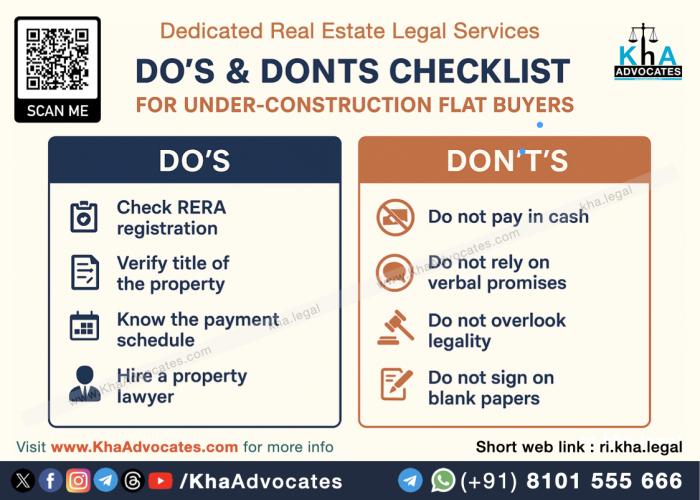
IntroductionBuying your dream home is one of the biggest financial and emotional decisions of life. Many buyers, especially first-time buyers, are drawn towards under-construction flats or apartments because they are often cheaper than ready-to-move-in properties and come with flexible payment options. However, under-construction properties also involve higher risks, such as project delays, legal disputes, or even fraud.As a buyer, knowing the legal process, safety measures, and essential do’s & don’ts can help you secure your investment and avoid unnecessary stress.At KHA Advocates, we assist property buyers with end-to-end legal support, from due diligence to registration, ensuring you buy your home with complete confidence.Step-by-Step Legal Process of Buying an Under-Construction Flat1. Check RERA RegistrationVisit your state’s RERA (Real Estate Regulatory Authority) portal.Verify whether the project is registered.Check the builder’s past projects, timelines, and compliance status.👉 Why it matters: Only RERA-approved projects provide legal safeguards for buyers.2. Verify Builder’s Title & ApprovalsConfirm the builder has clear ownership or development rights over the land.Check approvals from local authorities (municipality, fire, environmental clearance, etc.).👉 Why it matters: Buying from a builder without proper approvals can lead to cancellation of the project.3. Examine the Builder-Buyer AgreementCarefully review clauses on possession date, construction linked payments, cancellation, and refund policies.Look for hidden charges (maintenance, parking, club membership, etc.).👉 Why it matters: This agreement defines your rights – a lawyer can help negotiate unfavorable terms.4. Payment & Home Loan ProcedurePayments should follow the construction-linked plan and not exceed 10% before agreement registration (as per RERA).For home loans, banks conduct their due diligence – but don’t rely solely on bank approvals.5. Registration of Agreement for SaleLegally register your agreement at the Sub-Registrar’s office.Pay applicable stamp duty & registration charges.6. Possession & Occupancy CertificateBefore possession, check for Occupancy Certificate (OC) and Completion Certificate (CC).Without these, the property is legally incomplete.Safety Measures Before Booking an Under-Construction Flat✅ Check Builder’s Reputation – Past delays, litigation, financial standing.✅ Verify Carpet Area – RERA mandates selling on carpet area, not super built-up.✅ Escrow Account Compliance – Ensure builder deposits 70% of buyer’s funds in RERA account.✅ Timely Updates – RERA requires builders to provide construction progress updates online.✅ Legal Scrutiny of All Documents – Hire a property lawyer to verify every paper.Do’s & Don’ts List for Buyers✅ Do’s:Do verify the project’s RERA registration.Do conduct a legal title check of the land.Do hire a real estate lawyer for document vetting.Do keep all receipts, agreements, and builder communication in writing.Do check for hidden charges like GST, maintenance, parking.❌ Don’ts:Don’t rely solely on the builder’s brochure or promises.Don’t pay more than 10% of the cost before agreement registration.Don’t skip checking OC & CC before taking possession.Don’t ignore the fine print in the builder-buyer agreement.Don’t book based only on verbal assurances or flashy advertisements.Case Study: Buyers Saved by Legal Due DiligenceA group of buyers in Kolkata booked flats in an under-construction project that was heavily advertised. Our team at KHA Advocates was approached for due diligence. Upon inspection, we found that:The land title had a pending litigation.The builder had failed to secure environmental clearance.By acting early, the buyers avoided investing in a risky project and redirected their funds into a RERA-compliant development.👉 Lesson: A small investment in legal checks can save you from losing your life savings.Why You Need a Real Estate Lawyer for Under-Construction PropertiesContract Protection – Lawyers help negotiate builder-buyer agreements to protect your interests.Fraud Prevention – Prevents scams by verifying builder credentials and land titles.Compliance Checks – Ensures approvals and sanctions are in place.Dispute Resolution – Quick legal recourse in case of delays or defaults.Peace of Mind – Focus on your dream home while your lawyer safeguards your investment.ConclusionBuying an under-construction flat can be rewarding, but it comes with risks that only expert legal guidance can minimize. Don’t let hidden clauses, delayed possession, or fraud turn your dream home into a nightmare.At KHA Advocates, we specialize in property law and real estate legal services. From document verification to dispute resolution, we ensure that your home-buying journey is secure, transparent, and stress-free.👉 Build your dream home with confidence – Partner with KHA Advocates today!📞 Contact Us: +91-9477758885📧 Email: contact@khaadvocates.in📍 Location: New Town, Near CC2, Kolkata, West Bengal, India🌐 Visit: www.khaadvocates.com
Read More
IntroductionThe real estate industry is one of the most lucrative yet legally complex sectors in India. Every deal—whether it’s the purchase of land, the sale of flats, or large-scale township development—comes with a web of contracts, regulatory approvals, and compliance obligations. For real estate agents and developers, success is not just about finding the right buyer or executing a project; it’s about ensuring that every step is legally secure.This is why having an expert real estate lawyer on your side is no longer optional—it is a necessity. At KHA Advocates, we specialize in providing end-to-end legal solutions to real estate agents, developers, and investors, ensuring smooth transactions, risk mitigation, and faster deal closures.Why Real Estate Lawyers Are Indispensable1. Property Title Verification & Due DiligenceBefore finalizing any property deal, it is crucial to verify ownership and legal status.Our lawyers conduct title searches, encumbrance checks, mutation record verification, and litigation status checks.This ensures that developers and agents never risk selling or promoting disputed properties.2. Drafting & Reviewing AgreementsReal estate transactions involve Agreements to Sell, Sale Deeds, Development Agreements, Lease Deeds, RERA-compliant builder-buyer agreements, and Joint Venture Contracts.A minor error in drafting can lead to years of litigation or financial loss.Our expert lawyers ensure every clause safeguards your interest, prevents disputes, and complies with Indian property law.3. RERA Compliance & Regulatory ApprovalsWith the introduction of RERA (Real Estate Regulatory Authority), developers must comply with stringent guidelines before advertising or selling projects.We assist in RERA registration, quarterly compliance, buyer dispute defense, and regulatory filings.Real estate agents and developers who work with us avoid penalties, project delays, and reputational risks.4. Dispute Resolution & Litigation SupportProperty disputes are common—ranging from delayed possession claims, land acquisition disputes, buyer complaints, or contractual disagreements.Our legal team represents clients before RERA, Consumer Courts, Civil Courts, High Courts, and Arbitration Tribunals.Having a strong legal partner ensures disputes are handled strategically and quickly, protecting your brand reputation.5. Taxation & Financial StructuringReal estate transactions are heavily taxed through stamp duty, GST, TDS, and capital gains tax.Our lawyers collaborate with tax experts to structure deals in the most tax-efficient way, ensuring compliance while maximizing profits.6. Joint Ventures & Builder CollaborationsMany developers enter into Joint Development Agreements (JDAs) with landowners.Without proper legal safeguards, developers risk losing control or profits.Our team ensures fair drafting, profit-sharing clarity, exit clauses, and dispute resolution mechanisms in such collaborations.7. Faster Deal Closures with Legal BackupA property deal backed by a reputed law firm builds trust among buyers, investors, and financial institutions.When buyers see that all documents are vetted by KHA Advocates, confidence increases, leading to quicker sales and project funding.Why Real Estate Agents & Developers Prefer KHA Advocates✅ End-to-End Support – From due diligence to litigation defense.✅ RERA Specialists – Complete compliance support.✅ Deal Structuring Experts – Tax-efficient, legally sound transactions.✅ Strong Dispute Defense – Representation across courts and tribunals.✅ Trusted by Investors & Homebuyers – Our legal certification enhances credibility.Example Case StudyA leading developer in Kolkata faced a buyer dispute over delayed possession. The case went to RERA, where the buyer demanded refund with interest. By strategically defending the matter, KHA Advocates helped the developer avoid a ₹2 crore liability and negotiated an amicable settlement, saving both reputation and money.ConclusionIn today’s competitive real estate market, having an expert real estate lawyer is not a luxury—it’s a business strategy. From compliance to dispute resolution, lawyers ensure that every deal is legally sound, every agreement is enforceable, and every project runs without costly interruptions.At KHA Advocates, we pride ourselves on being the legal backbone for real estate agents and developers, empowering them to focus on growth while we safeguard their legal interests.Let's Connect with an Expert👉 Are you a real estate agent or developer looking for a trusted legal partner?👉 Do you want hassle-free deal closures, RERA compliance, and dispute protection?📞 Contact KHA Advocates today and let our expert real estate lawyers secure your deals.
Read More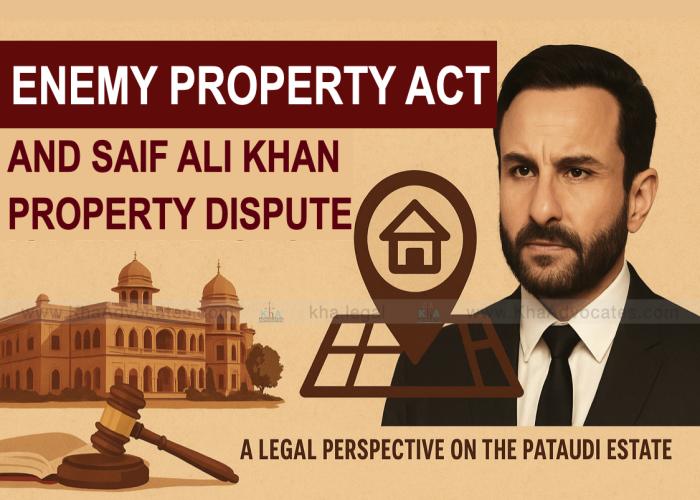
IntroductionThe Enemy Property Act, 1968 has often been in the news due to high-profile property disputes. One of the most talked-about cases involves Bollywood actor Saif Ali Khan and the prestigious Pataudi Estate. While many see this as a family inheritance matter, legally it is much more complicated, as the Enemy Property Act directly governs whether heirs like Saif can claim ownership of certain ancestral assets.This blog explores the legal perspective on the Enemy Property Act, its relevance to the Pataudi Estate dispute, and how it impacted Saif Ali Khan’s inheritance rights.What is the Enemy Property Act?The Enemy Property Act, 1968 was enacted by the Government of India after the Indo-Pak wars of 1965 and 1971. It essentially deals with properties left behind in India by people who migrated to Pakistan or China during these wars.Such properties were taken over by the Custodian of Enemy Property for India.Heirs of those who migrated were barred from claiming ownership rights.Even Indian citizens related to the “enemy” were restricted from succession to such properties.The law was strengthened further in 2017 through an amendment, making it clear that no heir of an enemy can inherit such property, even if they are Indian citizens.The Pataudi Estate Dispute – BackgroundThe Pataudi family, a prominent royal household in Haryana, traces its lineage back to Nawab Iftikhar Ali Khan and later Nawab Mansoor Ali Khan Pataudi. The estate included prime landholdings, palaces, and ancestral properties.The controversy began when it was argued that certain portions of the Pataudi Estate fell within the ambit of the Enemy Property Act due to the migration of some family members to Pakistan.This created legal hurdles in the inheritance of Saif Ali Khan, son of Mansoor Ali Khan Pataudi and Sharmila Tagore, despite him being an Indian citizen and legal heir.How the Enemy Property Act Affected the Pataudi Estate The legal complications arose because: • Some of Saif Ali Khan’s relatives, including family members connected to Bhopal and Hyderabad princely states, had migrated to Pakistan. • Under the Enemy Property Act, properties belonging to those relatives were considered enemy property. • This meant that even Indian-born heirs like Saif Ali Khan could not automatically inherit certain ancestral properties. Thus, while Saif was declared the legal heir to parts of the Pataudi Estate, the Enemy Property Act restricted his rights over portions of the ancestral property. How Did This Affect Saif Ali Khan? The direct impact of the Enemy Property Act on Saif Ali Khan was significant: 1. Inheritance Restriction – Saif could not freely inherit all properties linked to his ancestors because the law prohibited transfer of enemy property to heirs. 2. Legal Disputes & Delays – The Pataudi family faced litigation and government intervention, leading to a prolonged battle to establish ownership rights. 3. Loss of Royal Assets – Despite being the legal heir, Saif’s rights over parts of the estate were curtailed, preventing him from exercising full control. 4. Symbolic Loss of Heritage – For Saif, the dispute was not only about property value but also about ancestral pride and royal legacy. This demonstrates how even celebrity heirs are not immune to the far-reaching consequences of the Enemy Property ActLegal Perspective on the CaseFrom a legal standpoint, the dispute highlights several critical issues:Conflict between Succession Laws & Enemy Property ActNormally, under the Hindu Succession Act or personal laws, a son inherits his father’s property.However, the Enemy Property Act overrides succession rights, making heirs powerless if the property is classified as enemy property.Doctrine of Public PolicyThe Act is based on national interest, preventing properties linked to “enemies” from being exploited.But, in practice, it often impacts Indian citizens like Saif Ali Khan, raising concerns of fairness.Judicial InterpretationsIndian courts have consistently upheld the supremacy of the Act, limiting the scope of inheritance claims.This shows how special laws override general inheritance provisions.Lessons for Property Owners and HeirsThe Pataudi Estate dispute serves as a cautionary tale for families dealing with ancestral properties. Key lessons include:Title Verification is Crucial – Before claiming or buying any property, ensure it is not under the Enemy Property Act or other restrictions.Legal Documentation Matters – Proper succession deeds, wills, and title clearances can reduce future disputes.Seek Legal Expertise Early – Corporate lawyers and property law experts can prevent disputes from escalating into decades-long battles.NRI Families Must Be Extra Careful – Many NRIs unknowingly inherit properties linked to enemy properties, exposing them to long litigation.How Our Law Firm Can HelpAt KHA Advocates, we specialize in:Property Title Verification – Ensuring properties are free from legal encumbrances before purchase or transfer.Inheritance & Succession Advisory – Drafting wills, succession certificates, and family settlements to secure property rights.Dispute Resolution & Litigation Support – Representing clients in property disputes, including those under special laws like the Enemy Property Act.NRI Property Services – Helping NRIs manage, protect, and transfer their properties in India.If you’re facing property disputes or inheritance complications, our expert property lawyers can safeguard your rights.ConclusionThe Enemy Property Act was designed to protect national interests but has had profound implications on individual inheritance rights. The Saif Ali Khan Pataudi Estate dispute is a high-profile example of how this law can prevent rightful heirs from accessing ancestral property.For business owners, heirs, and NRIs, the key takeaway is clear: always seek legal due diligence and expert advice before claiming, buying, or transferring property👉 If you need guidance on property disputes, connect with KHA Advocates today and protect your rights before it’s too late.
Read More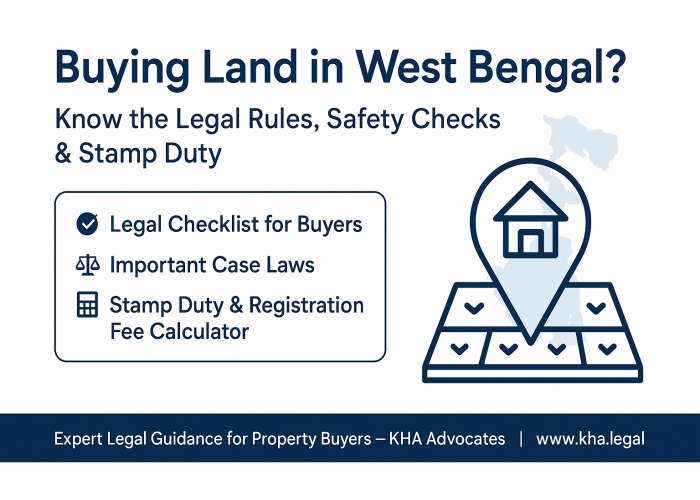
Buying land in West Bengal can be rewarding—but only if you get the legal basics right. This guide walks you through due-diligence steps, must-know rules under Bengal laws, and the current stamp duty & registration charges, with quick examples, case-law checkpoints, and a simple checklist you can use before you sign.1) Start with a Clean Title: What to Verifya) Chain of Title (minimum 30 years).Collect all prior deeds (sale, gift, partition, exchange) and compare RS/LR Dag & Khatian numbers, Mouza, and area across documents.Ensure there are no gaps in the chain and that every transferor actually had the right to sell.b) Encumbrance Check.Obtain an Encumbrance Certificate and search the Sub-Registrar’s records for mortgages, lis pendens, attachments, court orders, or ongoing disputes.c) Mutation vs. Ownership.Mutation (name change in Record-of-Rights/Porcha) is important for tax and utilities but it doesn’t prove ownership. Courts repeatedly hold that mutation entries are only for fiscal purposes and don’t create or extinguish title. d) Land Use & Conversion (Agricultural to Non-Agricultural).For agricultural plots, check conversion permissions (where applicable) and land-use restrictions before development.Verify local plans, zoning, road-widening reservations, waterbodies, thika land issues, coastal or forest restrictions, etc.e) Possession & Boundaries.Conduct a site survey with a licensed surveyor; match ground boundaries with revenue maps and deeds.Confirm access/right of way is legal and undisputed.f) Special Estates & Leaseholds.In areas like Bidhannagar (Salt Lake) and some industrial estates, you’re often buying leasehold rights with transfer conditions and authority permissions. Review allotment letters, lease deeds, and transfer policies carefully.Case-law guardrail: The Supreme Court in Suraj Lamp & Industries v. State of Haryana (2011) held that GPA/Agreement-to-Sell/Will (“SA/GPA/Will”) transactions do not convey title; only a registered conveyance deed transfers ownership of immovable property. Don’t rely on “GPA sales.” 2) Agreements & Documents You’ll Typically NeedTitle Verification Report (by your lawyer, post record and site checks)Agreement for Sale (with detailed reps/warranties; attach a schedule and accurate site plan)No-objection certificates/permissions (as applicable—ULC/ceiling compliance history, conversion NOC, municipal/revenue clearances, society/lessor consent)Registered Sale Deed at the jurisdictional Sub-Registrar office (mandatory to pass title). Recent Supreme Court guidance re-affirms that documents requiring registration are inadmissible to convey title if unregistered. 3) Stamp Duty & Registration Charges in West Bengal (2025)Use Stamp Duty Calculator developed by KhA AdvocatesImportant policy updates:West Bengal withdrew the temporary 2% stamp duty rebate and 10% circle-rate reduction from July 1, 2024 (initially introduced in Oct 2021). Always budget at full rates now. From January 17, 2024, the State announced stamp duty assessment on carpet area, not super built-up area (and simultaneously revised circle rates). Expect operational nuances while authorities refine forms. How to estimate online: Use the MV/SD/RF Calculator on the West Bengal Registration portal (select “Stamp Duty & Registration Fee”). 4) Bengal-Specific Pitfalls (and how to avoid them)Ceiling & Tenancy footprints: Trace historic land ceiling proceedings/regularizations and tenancy (bargadar) claims.Waterbodies/Khaitan descriptors: If the RoR shows doba, pukur, khal etc., special restrictions may apply; converting and filling may be prohibited without permissions.Thika & Khas Mahal land: Extra layers of consent/eligibility can apply—get a targeted legal opinion.Leasehold in planned townships: Check transfer charges, lessor’s prior consent, and lock-in conditions.Set-offs and approach roads: Verify right of way is recorded; don’t assume a neighbor’s path is public.“GPA sale” or “Notary deed” shortcuts: Avoid—no title passes without a registered conveyance. 5) Micro-Checklist Before You Pay Token Money✅ Title search (30 years) with encumbrance & litigation scan✅ RoR/Porcha & mutation status matched to deeds (knowing mutation ≠ title) ✅ Site survey & boundary match (with LR/RS maps)✅ Land use & conversion permissions verified✅ Utility dues & property tax updated; indemnities for past dues✅ No pending acquisition/road widening reservations✅ Drafting of robust Agreement for Sale (clear reps/warranties, indemnities, timelines, default & refund clauses)✅ Final deed: register at proper SRO; pay stamp duty + 1% registration via GRIPS/IGR portals; collect e-challans & final registered copy. 6) Case-Law Corner (What it means for you)Mutation ≠ Ownership. Courts consistently reiterate that mutation is fiscal/administrative and does not confer title—use it to update records and pay taxes, not as proof of ownership. Only a Registered Conveyance Passes Title. The Supreme Court in Suraj Lamp (2011) held SA/GPA/Willpathways do not transfer ownership. Insist on a registered sale deed. Recent Supreme Court orders continue to underscore Sections 17 & 49 of the Registration Act, 1908—unregistered documents that require registration are inadmissible to convey title. 7) FAQsQ1. What are the current stamp duty and registration rates in West Bengal?A. Registration fee is 1%. Stamp duty varies by location and value slab (e.g., rural 3–4%, urban 4–5% generally; Kolkata/Howrah slabs often reflect 6–7% bands). Use the IGR calculator for your exact local body and property value. Q2. Is the 2% stamp duty rebate still available?A. No. It ended June 30, 2024; normal rates apply from July 1, 2024. Q3. Is stamp duty based on carpet area or super built-up?A. The State announced assessment on carpet area (with other adjustments like circle-rate revisions). Expect implementation nuances; always check the latest form and local SRO practice. Q4. Can I buy through GPA/ATS to save time or cost?A. Avoid. No title passes without a registered conveyance. Q5. Do women or senior citizens get a concession in Bengal?A. Unlike some states, no general gender-based concession is provided; check if any time-bound schemes are notified. Use the IGR calculator for the precise figure. 8) How KHA ADVOCATES Helps You Close Safely (and Save Money)Title & Litigation Deep-Dive: We run a 30-year title audit, encumbrance search, and suit/attachment scan so you don’t inherit hidden risks.Structuring & Tax-smart Drafting: From Agreement for Sale to Sale Deed, we build iron-clad clauses(indemnities, default matrix, delayed possession compensation, price-protection) and align TDS, GST (ifany) and stamp duty planning to avoid penalties.Regulatory Navigation: Conversion, lessor/society permissions, RERA alignment, and municipal compliances—done end-to-end.Registration Day Concierge: Slot booking, GRIPS/IGR e-payments, document checks, witness coordination, and smooth execution at the SRO.'After-care: Mutation applications, tax meter shift, and record updates so your ownership reflects everywhere that matters.Free 15-minute Consultation: Planning to buy land in Kolkata, Howrah, Salt Lake, Siliguri, Durgapur or across Bengal? Book a call with KHA ADVOCATES to get a quick duty estimate + red-flag review of the property before you commit.9) Final TakeawaysDon’t rely on mutation as ownership proof; rely on clear title + registered deed. Budget stamp duty + 1% registration at post-rebate rates (effective July 1, 2024). Use the official calculator for exact numbers by local body and value, and get documents vetted before you pay token money. Need a precise stamp duty & fee calculation for your plot—and a same-day document red-flag review?Message KHA ADVOCATES now. One guided call can save you lakhs and months of stress.
Read More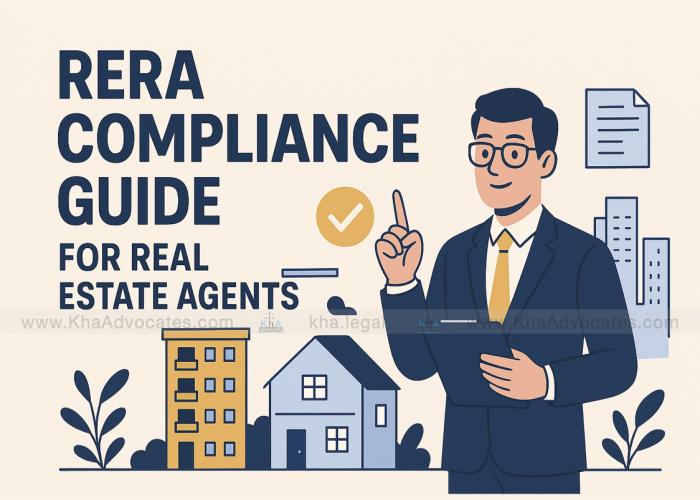
Introduction: Why RERA Matters for New AgentsIf you’re a real estate agent with less than three years of experience, you’ve probably heard the term RERA thrown around in conversations, training programs, and even client meetings. The Real Estate (Regulation and Development) Act, 2016 was introduced to bring transparency, accountability, and fairness to India’s real estate sector.For agents, RERA is not just a legal formality—it’s your license to operate, build trust, and close deals confidently. In fact, RERA compliance can be your biggest selling point when winning over clients.This guide will walk you through everything you need to know about RERA compliance, with practical tips, legal insights, and real-world advice tailored for agents like you.What is RERA and Why Should Agents Care?RERA was enacted to protect homebuyers and regulate the real estate industry. For agents, it:Makes registration mandatory to operate legally.Requires disclosure of property details before selling.Ensures ethical dealing with both buyers and developers.Failing to comply can result in hefty penalties or even being barred from business. On the flip side, RERA compliance can boost your credibility and help you close more sales.Step-by-Step RERA Compliance Checklist for Agents1. Register Yourself as a RERA AgentWhy? It’s the law. You cannot facilitate property sales without RERA registration.How? Visit your state’s RERA website, fill out the application form, upload required documents, and pay the registration fee.Tip: Always keep your registration number handy—it builds instant trust with clients.2. Understand Your State’s RERA RulesEach state has its own RERA authority and rules. For example, WBRERA in West Bengal, etc.Action Step: Bookmark your state’s RERA website and check for rule updates regularly.Benefit: Staying updated means you won’t accidentally violate new regulations.3. Work Only with Registered ProjectsSelling an unregistered project is a major violation. Always check the RERA project registration number before marketing or selling.Tip: Use the RERA portal to verify project details—buyers love agents who show them official proof.4. Disclose Accurate Information to ClientsUnder RERA, you must share all relevant details about a property—pricing, possession timelines, approvals, and amenities.Best Practice: Maintain a property fact sheet for every listing.5. Maintain Transaction RecordsRERA requires agents to keep proper records of transactions.Why? These can protect you in case of disputes.Pro Tip: Digitize your paperwork using cloud storage—it’s safer and faster to retrieve.6. Avoid Misleading AdvertisementsRule: Do not advertise unapproved layouts, amenities, or false possession dates.Example: If possession is 2027, don’t write “Ready in 2 Years” unless confirmed.7. Renew Your RERA Registration on TimeRERA registrations have an expiry date—usually 5 years, but it varies by state.Tip: Set calendar reminders for renewal at least 3 months in advance.8. Act as a Neutral FacilitatorRERA recognizes agents as intermediaries, not salespeople for one party.Ethics Tip: Always ensure fairness between the buyer and seller.9. Stay Updated with RERA AmendmentsThe law is evolving. Attend RERA workshops, webinars, or legal training to keep learning.Benefit: Your knowledge will set you apart from other new agents.10. Partner with a Legal MentorIf you’re new, navigating compliance can be overwhelming. Working with a law firm specializing in RERA can save you from costly mistakes and even speed up your deal closures.Common RERA Mistakes New Agents MakeSkipping registration to avoid fees.Not verifying projects before selling.Making verbal promises that can’t be kept.Ignoring renewal dates for registration.Not keeping proper documentation of transactions.Avoiding these mistakes will keep your record clean and your reputation strong.How RERA Compliance Helps You Win More ClientsBuilds trust – Buyers feel safer dealing with registered agents.Differentiates you – Many agents still operate without full compliance.Protects you legally – Compliance shields you from penalties and lawsuits.Boosts referrals – Happy, protected clients recommend you to others.FAQ – RERA for New Real Estate AgentsQ1. Do I need RERA registration if I only deal in rentals?A: No, RERA applies to property sales, not rentals. But check your state’s rules for exceptions.Q2. How much does RERA registration cost?A: Fees vary by state—usually between ₹25,000 for individuals.Q3. Can I operate in multiple states with one RERA license?A: No, you need separate registration for each state.Q4. What happens if I sell an unregistered project?A: You can face heavy fines or even imprisonment. Always verify before selling.Q5. How long does RERA registration take?A: Usually 15–30 days, depending on state processing times.Final Thoughts – Your Compliance is Your StrengthAs a new agent, it’s tempting to focus only on closing deals quickly, but in today’s regulated market, compliance is your competitive edge. Buyers and developers want to work with agents they can trust—and RERA compliance is proof of your professionalism.Don’t see RERA as a hurdle; see it as a business tool that helps you stand out in a crowded market.Let’s Build Your RERA-Ready CareerAt KHA Advocates, we act as your legal mentor—guiding you through RERA registration, project verification, agreement vetting, and compliance training.Whether you’re a new broker or a growing agency, our legal support ensures you operate 100% within the law while building a trustworthy brand.📞 Call us today at 9832-555-666 or 📧 email us at contact@khaadvocates.in to start your RERA-compliant journey.
Read More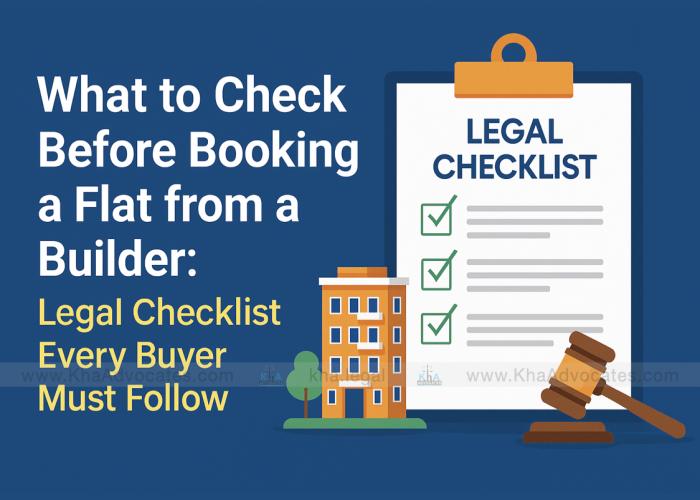
Booking a flat—especially in an under-construction or newly launched project—is a big step for any property buyer or investor. While glossy brochures, virtual tours, and builder promises may look appealing, failing to conduct a legal due diligence check before booking can result in financial losses, stalled projects, or court battles.At KHA ADVOCATES, we help buyers—especially first-timers and NRIs—safeguard their investments with comprehensive legal support. This guide lays out a legal checklist to follow before you pay that booking amount.1. Check if the Builder is RERA RegisteredWhy it matters:Under the Real Estate (Regulation and Development) Act, 2016, all builders must register their residential projects (above a certain size) with RERA.What to verify:RERA Registration NumberProject details on your state’s RERA websiteCompletion timeline and approvalsTip: Visit https://rera.gov.in and cross-check project details.📌 KHA Tip: We verify RERA registration and flag any discrepancies before you invest.2. Verify Title of the LandWhy it matters:The builder must legally own or have development rights over the land. If the land title is disputed or not clear, the entire project becomes risky.What to verify:Title Deed and Ownership Chain (30-year verification)Encumbrance Certificate (EC)Lease/Development Agreements (if applicable)📌 KHA Tip: We conduct deep title verification and provide certified legal title reports.3. Check Project Approvals & SanctionsWhy it matters:Without proper municipal and environmental approvals, the builder may face demolition or delay orders. You risk losing time and money.Key approvals to verify:Commencement Certificate (CC)Building Plan Sanction by local authorityEnvironmental Clearance (for large projects)Fire Safety and Airport NOC (if applicable)📌 KHA Tip: We inspect all sanctions and compare them with construction on-ground.4. Examine the Allotment Letter & Builder-Buyer AgreementWhy it matters:These are legally binding documents that define your rights, timelines, penalties, and possession terms.Watch for:Clause on delivery date and delay penaltiesForce majeure clausesEscalation charges or hidden costsRefund/termination terms📌 KHA Tip: We negotiate the Builder-Buyer Agreement and protect you from one-sided terms.5. Understand the Carpet Area ClausesWhy it matters:Builders often quote “super built-up area” to appear cheaper. But you only own the carpet area.Legal point:RERA mandates disclosure of carpet area and its definition.What to check:Clearly mentioned carpet areaLoading % (difference between super built-up and carpet)Agreement mentions area escalation clauses?📌 KHA Tip: We break down the loading percentage and explain your actual usable space.6. Check for Litigations & Pending CasesWhy it matters:Even a high-profile project can have pending disputes or litigation that stalls completion.How to check:Builder’s litigation history (via High Court/SC portals)RERA complaintsConsumer forum or NCLT disputes📌 KHA Tip: We do background checks on builders across legal portals and flag red zones.7. Verify the Builder’s Previous ProjectsWhy it matters:Past delivery record speaks volumes about future reliability.Things to verify:Completion historyQuality of constructionDelay frequencyConsumer complaints📌 KHA Tip: We verify past project delivery and check for blacklisted builders.8. Check Home Loan Pre-Approvals (If Any)Why it matters:If reputed banks have approved loans for the project, it signals that due diligence has been done. Still, it’s not foolproof.Check for:Which banks have approved the projectLoan eligibility termsLoan-to-value ratio offered📌 KHA Tip: We independently verify bank clearance and help you secure home loans at best rates.9. Ensure GST, Stamp Duty, and Tax Implications Are ClearWhy it matters:Tax liabilities, if not properly calculated, can spike your cost by lakhs.What to check:GST applicable for under-construction flats (usually 5% without ITC)Stamp duty & registration chargesTDS (1%) if value exceeds ₹50 lakh📌 KHA Tip: We help optimize your property taxes and legally reduce stamp duty wherever possible.10. Review Possession Timeline & Completion CertificateWhy it matters:You must legally take possession only after receiving the Occupancy Certificate (OC) or Completion Certificate (CC).Ensure:Delivery date is not vagueCompensation clause for delayFinal handover includes OC and NOC from authorities📌 KHA Tip: We ensure legal handover, post-registration compliance, and verify builder’s obligations.🚨 Never Pay in Cash or Unaccounted PaymentsWhy it matters:Any cash transaction is illegal and non-defendable in court. Always insist on full transparency.📌 KHA Tip: We ensure all payments are through legal channels and documented properly.Why Buyers & Investors Choose KHA ADVOCATESAt KHA ADVOCATES, we don’t just “check papers”—we secure your entire property purchase from booking to registration. Whether you’re a first-time buyer or seasoned investor, our services include:✔️ Title Verification (30 years)✔️ Builder-Buyer Agreement Drafting & Review✔️ Property Registration & Mutation✔️ Stamp Duty Optimization✔️ Legal Due Diligence & Litigation Check✔️ Home Loan Legal Support✔️ Dispute Prevention & Litigation📞 Ready to Book a Flat? Don’t Do It Without Legal Backing.📞 Book a Legal Consultation with KHA ADVOCATES👉 Call us now : 94-777-5-888-5👉 WhatsApp: 8101-555-666👉 Email us: contact@khaadvocates.in👉 Visit: www.khaadvocates.com
Read More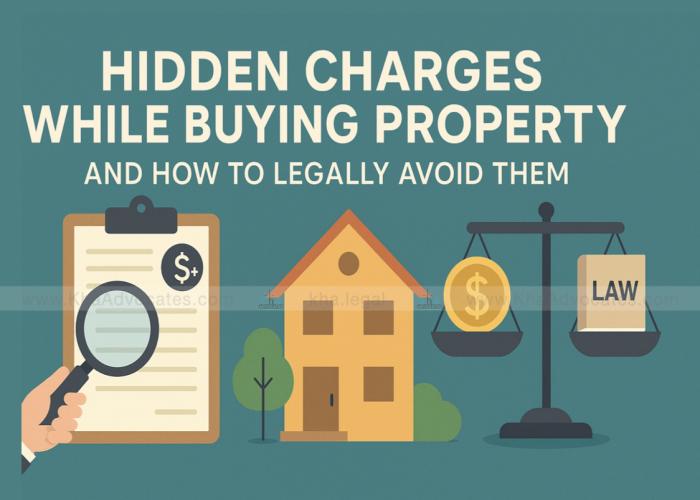
IntroductionBuying a property—especially for NRIs or first-time buyers in West Bengal—is often seen as a milestone achievement. However, what’s not visible in glossy brochures and site visits are the hidden charges that can inflate your cost by lakhs. Whether you’re eyeing a premium flat in Salt Lake or an investment property in Durgapur, knowing what lies beneath the surface is crucial to avoid legal and financial pitfalls.At KHA ADVOCATES, we’ve helped hundreds of clients legally uncover and prevent hidden property costs through rigorous legal due diligence, title search, and registration support.⚠️ Common Hidden Charges Most Buyers Overlook1. Legal Scrutiny & Title Due Diligence (Or Lack Thereof)Builders often charge legal processing fees, but these do not include independent title verification. Many NRIs assume the property is “clear,” only to later face disputes.Real Case: A buyer in New Town discovered, post-payment, that the property was under litigation despite having paid legal fees to the builder.✔️ Solution: Always appoint your own property lawyer for due diligence.2. GST on Under-Construction PropertyAs per current law, under-construction properties attract 5% GST (without ITC), while ready-to-move flats are exempt if the completion certificate is received.💡 Tip: Ask for the CC or OC (Occupancy Certificate) to avoid unnecessary tax burdens.3. Car Parking ChargesParking isn’t “free.” Many builders in Kolkata and Salt Lake charge ₹2–6 lakhs for open or covered parking, despite Supreme Court rulings stating parking cannot be sold separately from the flat.📜 Case Reference: Nahalchand Laloochand Pvt Ltd v. Panchali Co-op Housing Society Ltd – SC held that open parking cannot be sold as an independent unit.4. Clubhouse & Maintenance DepositsThese are often presented vaguely as “amenities charges.” In gated communities, builders demand 1–3 years of advance maintenance and non-refundable clubhouse development fees.✔️ Ask for a breakup of maintenance charges and get it in writing.5. Advance Registration ChargesSome developers insist on upfront registration payments. But beware—many delay handing over sale deeds or register in builder’s name first, forcing resale to buyer with double registration fee.✔️ Registration should only happen after OC/CC and full payment clearance.6. Hidden Floor Rise ChargesEven within the same building, rates differ per floor. Builders in Durgapur, Salt Lake, and Alipore may add ₹20–₹100/sqft for “floor rise” without disclosing this early.7. PLC – Preferential Location ChargesCorner flats, park-facing units, or east-facing homes may have added costs. These are negotiable but often hidden until agreement.✔️ Ask early about PLCs. Always include a clause to limit variation in final price.8. Delayed Possession Penalties SkippedAgreements often don’t mention compensation if possession is delayed. Or worse, they include one-sided clauses favoring the builder.📜 RERA mandates a fixed timeline and penalty for delay under West Bengal Housing Industry Regulation Act (WBHIRA).Legal Checklist to Avoid Hidden Charges✅ StepWhat You Must Check🔍 Title VerificationIndependent search of 30+ years of ownership📜 Agreement ClausesClear breakup of GST, PLC, parking, and maintenance🏗️ RERA RegistrationEnsure property is registered on WBHIRA portal🧾 All-Inclusive QuotationAvoid “base price” traps—ask for final cost🖋️ Builder-Buyer AgreementLegally vetted, RERA-compliant contract🧑⚖️ Legal OpinionHire a property lawyer—not builder’s panel advocatePros and Cons: Ready-to-Move vs Under-Construction in West BengalFeatureReady-to-MoveUnder-ConstructionGST✅ No GST❌ 5% GST (no ITC)Hidden ChargesFewerMany (Amenities, Floor rise, PLC)Risk of DelayMinimalHigh without strong contractRegistration TimelineImmediatePost-completionLegal SecurityHighMedium (depends on due diligence)Real-Life Case Study – How Legal Help Saved a Homebuyer ₹5.5 LakhsA client from Baharampur booked a flat in Chinsurah and was asked to pay ₹3 lakhs as “advance clubhouse charges” and ₹2.5 lakhs for “parking rights.” Our legal team reviewed the documents and found both charges illegal under WBHIRA and Supreme Court guidelines. After a formal notice, the builder dropped all additional demands.✔️ Result: Buyer saved ₹5.5 lakhs and got clean registration within 30 days.Frequently Asked Questions (FAQs)Q1: Can I refuse to pay parking charges to a builder?Yes, especially if it’s for open parking. Covered parking may be charged nominally but must be included in the sale agreement.Q2: Are these hidden charges legal under RERA/WBHIRA?No. Builders are mandated to disclose all charges up front. Any deviation can be challenged before the WBHIRA authority.Q3: What if the builder delays possession after I’ve paid full amount?Under RERA, you’re entitled to interest compensation or withdrawal with refund. Get a lawyer to enforce this through legal notice or complaint.Why Choose KHA ADVOCATES?Whether you are an NRI, first-time buyer, or investor, our legal team offers:✅ Title Verification & Search Report (30+ Years)✅ Sale Agreement & Deed Drafting✅ Builder-Buyer Agreement Vetting✅ Registration Support across West Bengal✅ RERA Dispute Handling & Legal NoticesWe’ve helped over 100 clients across New Town, Kolkata, Hooghly, Siliguri, and Durgapur avoid hidden traps and legally secure their investment.ConclusionHidden charges aren’t just financial nuisances—they can become legal nightmares. If you’re buying a property in New Town, Salt Lake, Baharampur, or anywhere in West Bengal, make sure your investment is protected with the right legal guidance.Ready to Buy Property in West Bengal?📞 Book a Legal Consultation with KHA ADVOCATES👉 Call us now : 94-777-5-888-5👉 WhatsApp: 8101-555-666👉 Email us: contact@khaadvocates.in👉 Visit: www.khaadvocates.com
Read More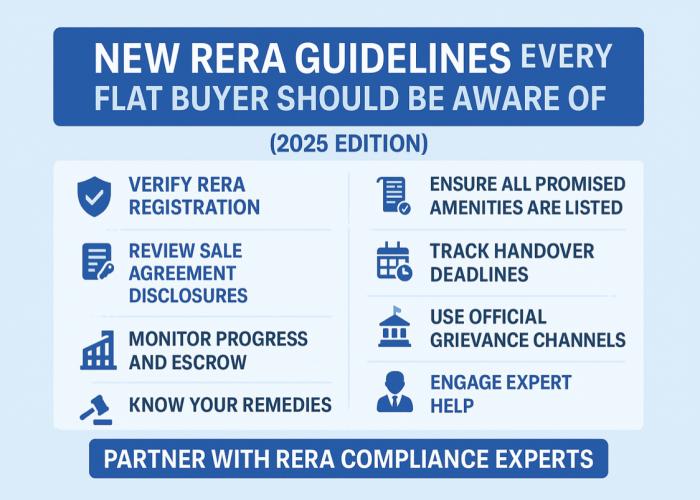
The Real Estate (Regulation and Development) Act, 2016 (RERA) is now the bedrock of homebuyer protection in India. Under RERA, developers must register each project and deposit most buyer funds in an escrow account (at least 70%) for that project . The latest 2024–25 guidelines strengthen this further. For example, MahaRERA’s Order 57/2024 now requires every sale agreement to list all promised amenities (gym, pool, garden, etc.) and their handover dates . This ensures developers clearly communicate project features and timelines to buyers.RERA also enforces tough penalties for delays or defaults. Section 18 of the RERA Act gives buyers the right to exit a project and get a full refund (with interest) if the builder misses possession deadlines . This isn’t just theory: in early 2025, a Karnataka RERA tribunal ordered a builder to return ₹2.56 crore (with interest) to a flat-buyer after a seven-year delay . Likewise, Haryana’s RERA recently held a developer accountable for a decade-long delay, ordering him to refund ₹1.07 crore plus 11.1% interest (total ₹2.26 crore) to the buyer . Builders must also fix structural defects at their own cost for five years after possession, extending warranty protection far beyond older norms.Because of RERA’s enforcement, buyers now see promised homes and amenities materialize more reliably. Developers must commit to fixed delivery dates for every facility – from swimming pools to clubhouses – or face penalties. For instance, Telangana RERA found a Hyderabad project only 20% complete after three years and ordered refunds with 11% interest to all 62 buyers for the delay . Experts note that requiring exact handover dates “adds accountability,” since homebuyers clearly know when to expect each promised feature .Other key safeguards remain in force. By law, 70% of the money you pay to the builder must go only into the RERA-designated account for that project , preventing diversion of funds. Builders cannot advertise or sell flats before RERA approval, and any violations invite penalties or cancellations. Importantly, recent court rulings confirm that homebuyers can pursue remedies under RERA and under consumer-protection laws simultaneously. In short, fraud or delay can no longer be swept under the rug – homebuyers now have multiple legal venues to insist on fair play.While RERA is implemented state-by-state, its core protections are national. In fact, regulators are building a unified national RERA portal to standardize data across all states . Soon, any buyer will log in and see a developer’s entire track record and project status across India. This integrated system will group every project of a builder together (preventing them from hiding bad history under shell entities) . The goal is to give flat buyers one-click access to key project information and quickly flag any non-compliance.Simplified Checklist for Flat Buyers (2025)Verify RERA registration: Always check that your flat’s project and the developer are registered on the state RERA portal. Official RERA websites list project approvals, layout plans and quarterly progress updates. If the builder isn’t RERA-registered, walk away – you lose all legal protection .Review sale agreement disclosures: Confirm the agreement spells out all promised amenities (pool, gym, garden, etc.) and the deadlines for each . New RERA rules require this level of detail. Any major change later needs the consent of two-thirds of homebuyers . If an amenity is promised in marketing, it must be clearly in the contract.Monitor progress and escrow: Ensure 70% of your payments are going into the RERA escrow account (ask the builder or check RERA filings for confirmation). Track construction progress via the RERA portal or status reports. Soon you’ll even be able to use the national RERA platform to compare projects nationwide . Regularly check that the project is meeting its promised milestones.Know your remedies: If possession is delayed, RERA Section 18 guarantees a full refund plus interest on your payments . If you stay invested, you’re entitled to monthly interest for each month of delay. After handover, RERA gives you a 5-year warranty on structural or major defects. Keep all documents and immediately notify the builder (and RERA) of any delays or defects.Use official grievance channels: File a complaint on the RERA portal at the first sign of trouble. State RERAs generally resolve valid cases within a few months once hearings are scheduled. You can also approach a consumer court in parallel. Provide your sale deed, payment receipts and correspondence to strengthen your case.Engage expert help: RERA compliance can be complex for first-time buyers. Consider consulting RERA verification specialists to review the project before booking. Our RERA compliance service can audit the project’s registration, agreements and builder track record against the latest rules. This expert check helps you avoid costly mistakes.Partner with RERA Compliance ExpertsKeeping up with RERA updates and legal paperwork can be daunting. Our firm offers dedicated RERA compliance guidance to simplify the process. We will review all project documents, verify the builder’s RERA registration and ensure every new 2025 guideline is satisfied. We even monitor construction updates and follow up with regulators if needed. By turning a complex legal checklist into step-by-step guidance, we give you peace of mind. With experts on your side, you can confidently move forward with your new home purchase.Key takeaway: RERA 2025 is about transparency and accountability. Use the above checklist before signing any deal. Remember, under RERA delays and omissions now cost the builder – not you – as confirmed by recent rulings . Armed with the latest guidelines and professional support, flat buyers can invest with confidence.Here’s a promotional and lead generation section tailored for your blog article, “New RERA Guidelines Every Flat Buyer Should Be Aware Of (2025 Edition)”, designed to fit seamlessly near the end of the blog and optimized for SEO and conversion:Why Choose KHA ADVOCATES for RERA Compliance & Property Legal Support?At KHA ADVOCATES, we specialize in protecting the rights of NRI clients, first-time homebuyers, and real estate investors across Kolkata, including New Town and Salt Lake. With decades of experience in real estate law, we ensure that your property journey is legally secure, RERA-compliant, and stress-free.Our RERA & Property Legal Services Include:Full RERA Project Verification (West Bengal RERA, pan-India)Sale Agreement & Builder Agreement VettingTracking Escrow & Possession Timeline CommitmentsLegal Due Diligence & Title Search ReportSupport in Filing RERA Complaints & Refund ClaimsRegistration, Stamp Duty, Mutation & HIRA AssistanceWhether you’re booking a ready-to-move apartment in Salt Lake or investing in an under-construction property in New Town, we’ll help you understand:✔ What your builder can and cannot do under RERA✔ Whether your documents meet 2025 legal compliance✔ What your refund or compensation rights are if timelines slip📞 Book a Free Consultation TodayAvoid costly legal pitfalls before you buy. Let KHA ADVOCATES protect your investment with verified property documentation and expert RERA compliance.👉 Call us now : 94-777-5-888-5👉 WhatsApp: 8101-555-666👉 Email us: contact@khaadvocates.in👉 Visit: www.khaadvocates.com👉 Offices: Kolkata | Virtual Consultations for NRIs 🌐🔐 Buying a Flat? The Builder May Promise. We Legally Verify.Stay protected. Stay informed. Partner with KHA ADVOCATES — your trusted legal shield in Indian real estate.
Read More